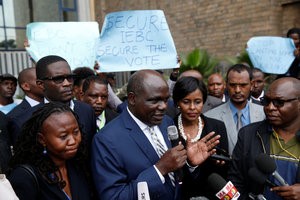By Katharine Houreld
NAIROBI, (Reuters) - Protesters marched on the offices of Kenya's election commission on Tuesday, demanding a speedy investigation of the murder of a senior official that has raised fears over the legitimacy of next week's national elections.
Chris Msando, the election board's head of information, communication and technology, was found murdered on Monday. He had been tortured before he was killed, authorities said.
Msando oversaw the live transmission of election results, a contentious area that the opposition has said could be used to rig next Tuesday's presidential and parliamentary polls.
In a sign of public jitters, Kenya's military spokesman was forced to go on national television on Tuesday evening and deny reports he was missing. Some media outlets suggested he had been abducted after leaking details of election-related security.
The presidential race is very close: Opposition leader Raila Odinga is favoured by 49 percent of voters compared with President Uhuru Kenyatta's 48 percent, according to a poll of 5,000 Kenyans across 47 counties released on Tuesday by Infotrak Research and Consulting.
Another poll put Kenyatta in the lead with 47 percent and Odinga at 44 percent, according to a survey of 4,300 Kenyans released on Tuesday by international polling firm Ipsos.
The close race, the murder, and a history of malfunctions of election equipment have raised tensions in Kenya and provoked a storm of speculation on social media.
"It is important that security agencies expedite investigations as a matter of utmost urgency," John Githongo, a prominent anti-corruption campaigner, said during the march by about 25 protesters.
"The timing of his torture and murder serves to undermine Kenya's election management body," he added, as the group sang and held up banners denouncing the killing.
Kenyatta issued a statement condemning the killing of Msando and Caro Ngumbu, a woman who had been shot in the head and whose body was found next to Msando's.
Kenyatta urged faith in investigators and for the public to refrain from speculation about the motives for the killings.
"Careless speculation in this time of grief only makes the work of investigators harder, and it only adds to the pain of those who loved him," the president said, urging the country to remain united ahead of the vote.
"This is not the time to allow a tragedy such as this to divide us, to turn brother against brother."
Authorities did not say where Msando's body was found or suggest a motive. He had deep lacerations on his hands and arms and he had been "unmistakably" tortured, an official at the election commission told Reuters. The official asked not to be named.
Msando had met Ngumbu and another man at a club, said a statement from the interior ministry. The man left earlier and Msando and Ngumbu left together around 1:00 am, said the statement. Their bodies were discovered nearby the following morning.
Msando had reported to police in December that he had received threatening messages and phone calls in October, the statement said, but he had not followed up his initial complaint.
The opposition called for outside experts to help ensure the credibility of the elections.
"This murder has jeopardised Kenyans' faith in the credibility of the electoral process," Musalia Mudavadi, a key Odinga ally, told journalists.
"To restore the shaken confidence in the electronic systems that are key to the credibility and the success of the election ... the (elections body) should immediately secure the services of an internationally recognised expert in the area."
Both the United States and Britain offered to help Kenya investigate the murder, without saying how.

Odinga has said the last two elections were rigged. In 2013, he took his complaints to court and the elections were largely peaceful. But in 2007, he called for street demonstrations, and the political protests and ethnic violence that followed killed more than 1,200 people and forced another 600,000 to flee their homes.